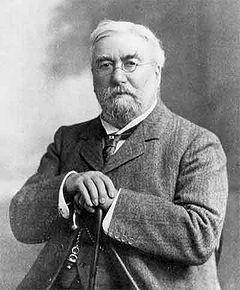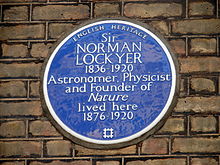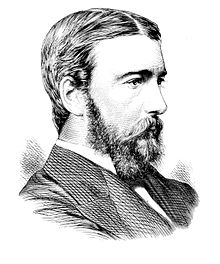- Norman Lockyer
-
Joseph Norman Lockyer 
from Proceedings of the Royal Society (1909)Born 17 May 1836
Rugby, Warwickshire, EnglandDied 16 August 1920 (aged 84)
Salcombe Regis, Devon, EnglandNationality British Fields Astronomy Known for Discovery of helium Sir Joseph Norman Lockyer, FRS (17 May 1836 – 16 August 1920), known simply as Norman Lockyer, was an English scientist and astronomer. Along with the French scientist Pierre Janssen he is credited with discovering the gas helium. Lockyer also is remembered for being the founder and first editor of the influential journal Nature.
Contents
Biography
Lockyer was born in Rugby, Warwickshire. After a conventional schooling supplemented by travel in Switzerland and France, he worked for some years as a civil servant in the British War office. He settled in Wimbledon, South London after marrying Winifred James. A keen amateur astronomer with a particular interest in the Sun, Lockyer eventually became Director of the Solar Physics Observatory in Kensington London.
In the 1860s Lockyer became fascinated by electromagnetic spectroscopy as an analytical tool for determining the composition of heavenly bodies. He conducted his research from his new home in West Hampstead, with a 6¼ inch telescope which he already used Wimbledon.[1] With a wavelength of about 588 nm, slightly less than the so-called "D" lines of sodium. the line could not be explained as due to any material known at the time, and so it was suggested by Lockyer that the yellow line was caused by an unknown solar element. He named this element helium after the Greek word 'Helios' meaning 'sun'. An observation of the new yellow line also was made by Janssen at the same eclipse, and so he and Lockyer usually are awarded joint credit for helium's discovery. Terrestrial helium was found about 10 years later by William Ramsay. In his work on the identification of helium, Lockyer collaborated with the noted chemist Edward Frankland.[2]
To facilitate the transmission of ideas between scientific disciplines, Lockyer established the general science journal Nature in 1869. He remained its editor until shortly before his death.
Lockyer led eight expeditions to observe solar eclipses for example in 1870 to Sicily, 1871 to India and 1898 to India.[1]
After his retirement in 1911, Lockyer established an observatory near his home in Salcombe Regis near Sidmouth, Devon. Originally known as the Hill Observatory, the site was renamed the Norman Lockyer Observatory after his death. For a time the observatory was a part of the University of Exeter, but is now owned by the East Devon District Council, and run by the Norman Lockyer Observatory Society. The Norman Lockyer Chair in Astrophysics at the University of Exeter is currently held by Professor Tim Naylor, who heads a star formation group there.
Lockyer died at his home in Salcombe Regis in 1920, and was buried there in the churchyard of St Peter and St Mary.[3][4]
Publications
- Norman Lockyer (1889). Elementary Lessons in Astronomy. Macmillan and co.. http://books.google.com/?id=76ABAAAAYAAJ&printsec=frontcover&dq=norman+lockyer#PPR3,M2. (1868–94)
- Questions on Astronomy (1870)
- Norman Lockyer (1874). Contributions Contributions to Solar Physics. Macmillan and co.. http://books.google.com/?id=yggAAAAAMAAJ&printsec=frontcover&dq=norman+lockyer#PPR3,M2Contributions. (1873)
- Joseph Norman Lockyer (1873). The Spectroscope and Its Applications. Macmillan and Co.. http://books.google.com/?id=EbANQlPbaS0C&pg=PA1&dq=norman+lockyer#PPP9,M2. (1873)
- Norman Lockyer, George Mitchell Seabroke (1878). Stargazing. Macmillan and co.. http://books.google.com/?id=fRVDAAAAIAAJ&printsec=frontcover&dq=norman+lockyer#PPR3,M2. (1878)
- Norman Lockyer (1878). Studies in spectrum analysis. C. K. Paul. http://books.google.com/?id=sOvH6Cr8GEoC&printsec=frontcover&dq=norman+lockyer#PPR3,M1. (1878)
- Report to the Committee on Solar Physics on the Basic Lines Common to Spots and Prominences (1880)
- Joseph Norman Lockyer, Norman Lockyer (1887). The Movements of the Earth. Macmillan and co.. http://books.google.com/?id=sZ05AAAAMAAJ&printsec=frontcover&dq=The+Movements+of+the+Earth#PPR3,M2. (1887)
- Norman Lockyer (1887). The Chemistry of the Sun. Macmillan and co.. http://books.google.com/?id=tr8KAAAAIAAJ&printsec=frontcover&dq=norman+lockyer#PPR3,M2. (1887)
- Norman Lockyer (1890). The Meteoritic Hypothesis. Macmillan. http://books.google.com/?id=qTUJAAAAIAAJ&printsec=frontcover&dq=norman+lockyer#PPR3,M2. (1890)
- Penrose, F.C., (communicated by Joseph Norman Lockyer), The Orientation of Greek Temples, Nature, v.48, n.1228, May 11, 1893, pp. 42–43
- Norman Lockyer (1894). The Dawn of Astronomy. Cassell. http://books.google.com/?id=FQZDAAAAIAAJ&printsec=frontcover&dq=norman+lockyer#PPR5,M2. (1894)
- The Rules of Golf: Being the St. Andrews Rules for the Game (1896), with William Rutherford
- Norman Lockyer (1897). The Sun's Place in Nature. The Macmillan company. http://books.google.com/?id=egsAAAAAMAAJ&pg=PR15&dq=norman+lockyer#PPR3,M2. (1897)
- Recent and Coming Eclipses (1900)
- Norman Lockyer (1900). Inorganic Evolution as Studied by Spectrum Analysis. Macmillan and co., limited. http://books.google.com/?id=ui1KAAAAMAAJ&pg=PA167&dq=norman+lockyer#PPR3,M2. (1900)
- Norman Lockyer (1903). On the Influence of Brain Power on History. Macmillan and Co., Limited. http://books.google.com/?id=Vw8BAAAAYAAJ&printsec=frontcover&dq=norman+lockyer#PPA5,M2. (1903)
- Stonehenge and Other British Stone Monuments Astronomically Considered (1906; second edition, 1909)
- Norman Lockyer, Joseph Norman Lockyer (1906). Education and National Progress. Macmillan and co.. http://books.google.com/?id=9w4CAAAAYAAJ&printsec=frontcover&dq=norman+lockyer#PPR3,M2. (1907)
- Norman Lockyer, Joseph Norman Lockyer (1909). Surveying for Archaeologists. Macmillan and co., limited. http://books.google.com/?id=Pr9CAAAAIAAJ&printsec=frontcover&dq=norman+lockyer#PPR3,M1. (1909)
- Norman Lockyer, Winifred Lucas Lockyer (1910). Tennyson, as a Student and Poet of Nature. Macmillan. http://books.google.com/?id=lm1LAAAAMAAJ&printsec=frontcover&dq=norman+lockyer#PPA1,M2. (1910)
Honours and awards
- Fellow of the Royal Society (1869)
- Janssen Medal, Paris Academy of Science (1875)
- Knight Commander of the Order of the Bath (1897)[5]
- President, British Association (1903 – 1904)
References
- ^ a b Cortie, A. L. (1921). "Sir Norman Lockyer, 1836 – 1920". Astrophysical Journal 53: 233–248. Bibcode 1921ApJ....53..233C. doi:10.1086/142602.
- ^ Hearnshaw, J. B. (1986). The Analysis of Starlight. Cambridge: Cambridge University Press. pp. 84–85. ISBN 0521255481.
- ^ Jacobson, Walter. "Around the Churches of East Devon". http://genuki.cs.ncl.ac.uk/DEV/DevonIndexes/EastDevonChurches.html. Retrieved 2008-01-30.
- ^ Edwards, D. L. (1937). "Report of the Proceedings of the Sidmouth, Norman Lockyer Observatory". Monthly Notices of the Royal Astronomical Society 97: 309–310. Bibcode 1937MNRAS..97..309.. http://articles.adsabs.harvard.edu/full/seri/MNRAS/0097//0000309.000.html. Retrieved 2008-01-30.
- ^ Meadows, A. J. (1972). Science and Controversy. Cambridge, Massachusetts: MIT Press. p. 237. ISBN 0230220207.
Further reading
- Meadows, A. J. (1972). Science and Controversy. Cambridge, Massachusetts: MIT Press. ISBN 0230220207.- A biography of Lockyer
- Wilkins, G. A. (1994). "Sir Norman Lockyer's Contributions to Science". Quarterly Journal of the Royal Astronomical Society 35: 51–57. Bibcode 1994QJRAS..35...51W.
External links
- Norman Lockyer Observatory & James Lockyer Planetarium
- Archives of the Norman Lockyer Observatory (University of Exeter)
- Norman Lockyer Observatory radio station in Sidmouth
- Certificate of candidacy for Lockyer's election to the Royal Society
- Brief biography of Lockyer by Chris Plicht
- Prof. Tim Naylor, Norman Lockyer Professor of Astrophysics
- Astrophysics Group, University of Exeter
- The 1871 solar eclipse
Categories:- 1836 births
- 1920 deaths
- People from Rugby, Warwickshire
- English astronomers
- Discoverers of chemical elements
- Fellows of the Royal Society
- English science writers
Wikimedia Foundation. 2010.


